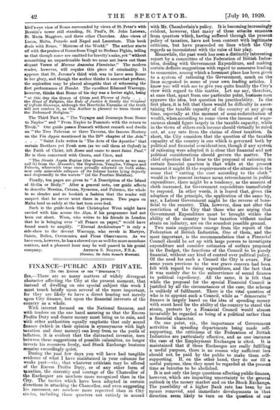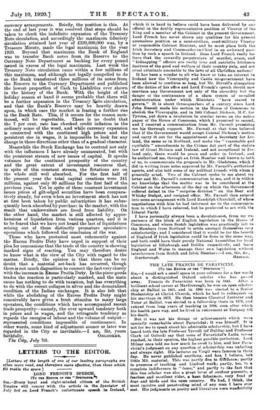FINANCE—PUBLIC AND PRIVATE.
[To TEE EDITOR Or THE " SPECurOin SIN,—There are so many matters of widely divergent character affecting the City at the present moment, that instead of dwelling on one special subject this week I must touch briefly upon several of the more important, for they are likely to have a direct bearing not merely upon City finance, but upon the financial interests of the country as a whole.
With interest focused on the National finances, and with traders on the one hand assuring us that the Excess Profits Duty and dearer money must bring us to ruin, and with other authorities equally emphatic that only sound finance (which in their opinion is synonymous with high taxation and dear money) can keep from us the perils of inflation, it is evident that the distracted investor, torn between these suggestions of possible calamities, no longer invests his resources freely, and Stock Exchange business remains exceedingly quiet. During the past few days you will have had tangible evidence of what I have maintained in your columns for weeks past—viz., that whatever criticism may be offered of the Excess Profits Duty, or of any other form of taxation, the sincerity and courage of the Chancellor of the Exchequer are nowhere more recognized than in the City. The tactics which have been adopted in certain directions in attacking the Chancellor, and even suggesting his successor, are nowhere more regretted than in City circles, including those quarters not entirely in accord with Mr. Chamberlain's policy. It is becoming increasingly evident, however, that many of these attacks emanate from quarters which, having suffered through the present policy of taxation, have not been content with legitimate criticism, but have proceeded on lines which the City regards as inconsistent with the rules of fair play. Meanwhile, the past week has seen a distinctly interesting report by a committee of the Federation of British Indus- tries, dealing with Government Expenditure, and making certain definite suggestions with regard to measures leading to economies, among which a foremost place has been given to a system of rationing the Government, much on the lines suggested in some of your own leading articles. I know you will wish me to give you quite frankly the City's view with regard to this matter. Let me say, therefore, at once that, apart from one particular point, business men approve the idea, but question its practicability. In the first place, it is felt that there would be difficulty in ascer- taining the taxable capacity of the country at any given time, especially at this moment of semi-redistribution of wealth, when according to some views the income of wage- earners should figure largely in the taxable capacity, while in the views of others such income should virtually be ruled out, at any rate from the claims of direct taxation. In short, the City considers that the question of the taxable capacity of the country is one which is governed both by political and financial considerations, though if any system of rationing were adopted it is clear that financial and not political considerations should govern the matter. The chief objection that I hear to the proposal of rationing in certain financial quarters is that while at the present moment it might fit the requirements of the situation in the sense that "cutting the coat according to the cloth" would in the present instance mean retrenchment in public expenditure, there might be a tendency, as the amount of cloth increased, for Government expenditure immediately to respond. In other words, it is feared that, given the adoption of the principle, the application of the same by, say, a Labour Government might be the reverse of bene- ficial to the country. This, however, does not alter the conviction of the City that those who are urging that Government Expenditure must be brought within the ability of the country to bear taxation without undue strain on industry, are on the soundest possible ground. Two main suggestions emerge from the report of the Federation of British Industries. One of them, and the most important, is the recommendation that a Financial Council should be set up with large powers to investigate expenditure and consider estimates of outlays proposed in the Budget, the functions of the Council to be purely financial, without any kind of control over political policy. Of the need for such a Council the City is aware. For some years previous to the war grave concern had been felt with regard to rising expenditure, and the fact that it was mainly due to the subservience of sound finance to political expediency. All the same, it is felt that while the proposal for the special Financial Council is justified by all the circumstances of the case, the scheme is unlikely of fulfilment. There is the vital question of who is to appoint such a Council, while as " democratic " finance is largely based on the idea of spending money with scant heed for the ability of the country to stand the strain, protests by a Financial Council would almost invariably be regarded as being of a political rather than a financial character.
On one point, viz., the importance of Government activities in spending departments being made self- supporting, the criticisms of the Federation of British Industries are particularly effective, and as one instance the case of the Employment Exchanges is cited. It is maintained that if these Exchanges are really fulfilling a useful purpose, there is no reason why sufficient fees should not be paid by the public to make them self- supporting. If, on the other hand, they do not fill a useful purpose, then they must be regarded at the present time as luxuries to be abolished.
It is not only the large questions affecting public finance, however, which are imparting uncertainty to the general outlook in the money market and on the Stock Exchange. The possibility of a higher Bank rate has been by no means removed, and immediate developments in that direction seem likely to turn on the question of our currency arrangements. Briefly, the position is this. At the end of last year it was resolved that steps should be taken to check the indefinite expansion of the Treasury Note circulation, and accordingly the maximum fiduciary circulation attained last year of £320,600,000 was, by a Treasure Minute, made the legal maximum for the year 1920. Beyond that maximum the Bank of England was to transfer Bank notes from its Reserve to the Currency Note Department as backing for every pound issued in excess of the legal maxim.um.. Last week the Treasury Note circulation came within a few millions of this maximum, and although not legally compelled to do so the Bank transferred three millions of its notes from the Reserve to the Currency Department and published the lowest proportion of Cash to Liabilities ever shown in the history of the Bank. With the height of the holiday season at hand it seems probable that there will be a further expansion in the Treasury Note circulation, and that the Bank's Reserve may be heavily drawn upon, in which case the market is fearing a further rise in the Bank Rate. This, if it occurs for the reason men- tioned, will be regrettable. There is no doubt that the 7 per cent, rate has checked credit inflation in the ordinary sense of the word, and while currency expansion is connected with the continued high prices and the persistent rise in wages, it is impossible to look for any change in those directions other than of a gradual character.
Meanwhile the Stock Exchange has to contend not only with the influences I have already enumerated, but with the persistent stream of new issues of capital. It speaks volumes for the continued prosperity of the country and the great extent of investment resources that, in spite of this constant stream., the flotations are on the whole still well absorbed. For the first half of the present year the total capital creations were 241 millions, against only 80 millions for the first half of the previous year. Yet in spite of these constant investment issues prices of gilt-edged securities have been compara- tively steady, for even when an investment stock has not at first been taken by public subscription it has subse- quently been absorbed by purchas3 in the market, with the result that underwriters are freed from liability. On the other hand, the market is still affected by appre- hensions of liquidation from various quarters, and it is to be feared that we have not heard the last of liquidations arising out of these distinctly premature speculative operations which followed the conclusion of the war.
Those who have protested most vehemently against the Excess Profits Dirty have urged in support of their plea for concessions that the trade of the country is showing marked signs of reacting. You may therefore desire to know what is the view of the City with regard to the matter. Briefly, the opinion is that there can be no doubt that a material set-back has occurred, though there is not much disposition to connect the fact very closely with the increase in Excess Profits Duty. In the piece-goods trades the reaction is particularly marked, and the main cause has nothing to do with taxation, but has everything to do with the recent collapse in silver and the demoralised condition of the Indian exchanges. It is also felt that while the abolishing of the Excess Profits Duty might conceivably have given a fresh stimulus to many large operators, the conditions which have accompanied recent trade prosperity—namely, the ever upward tendency both in prices and in wages, and the retrograde tendency as regards the energies of labour and the volume of output— represented conditions impossible of continuance. In other words, some kind of adjustment sooner or later was regarded in the City as inevitable.—I am, Sir, yours



































 Previous page
Previous page